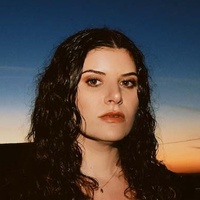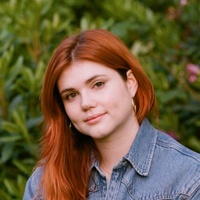On what creativity tells us about ourselves and our world
Prelude
Lafayette Cruise’s practice intersects urban planning and futurism to explore the question: How can we expand our collective imagination of who belongs in our future communities and how we facilitate belonging in the present? He is a member of the Guild of Future Architects, has taught at the University of the Arts London, and is currently a lecturer at the Rhode Island School of Design. Emerging from an early career in urban governance and his masters thesis, his practice is rooted in collaborating to create and hold space for radical public and policy imagination. That has manifested as speculative salons for racialized urban planners and artists, co-creating a world-building methodology, writing short fiction, constructing speculative worlds for other media projects, and teaching.
Conversation
On what creativity tells us about ourselves and our world
Urban Planner and futurist Lafayette Cruise discusses curiosity as exploration, what it is to be creative, and finding the artfulness in utility.
As told to Pola Pucheta, 1074 words.
Tags: Architecture, Design, Education, Process, Identity, Politics.
How would you describe your creative practice?
I’m an urban planner and a futurist, and my practice sits at the intersection of urban planning policy and speculative fiction. Speculative fiction refers to everything from imagining whole new histories to very small what if’s. In my practice, I think through what would have emerged if at a certain inflection point in history—or in the near future—we made a different decision. I think that urban planning is a form of speculative fiction, and popular fiction informs our expectations of policy and planning. At that nexus a lot of different things explode, and I’ve been experimenting with different media to explore that question.
Given that imagination is so essential to creativity no matter what kind of artist you are, what strategies or recommendations do you have for people who are trying to tap into their own imaginative or speculative power?
When I think of how to get people started, I bring them through a line of inquiry. I ask, “What is one thing that is frustrating about your city, or about where you live?” or even, “What’s one thing that you wish was expanding? What would it look like in 100 years?” Maybe something like, “What is your community? How do you define your community? What are some things that they are struggling with, or that you are hoping for for them? What questions do you have for them? What do you think they will think about you? How do you think they’ve learned about you?” Just taking the time to sit there and think through questions of the kind of world that we exist in and what we are hoping for is a good place to start.
What does your curiosity look like? How do you find you best explore or analyze things?
It is both slow and social. Work is a way to socialize, collaboration is a way to socialize. For me, curiosity is about exploring what it means to experience connection with other people. What does it mean to relate to other things? At this moment, I’m curious about how different modes of artistic creation and being help us learn about relationships.
A lot of people have this notion around a spectrum of creativity. At one end, we have the utility of things, at the other end, we have the beauty and artfulness of things. Is that something that you think about in your work, the utility of things versus their aesthetic nature?
I think there is a racist, modernist and sexist undergirding of positing utility and aesthetics as separate things. We know that the way things look affect us—that is how we’ve evolved as a species. Just because a certain number of men were incapable of reading the meaning behind ornament, or the reading behind beautiful things, they took them to be superfluous. I’m trying to challenge the hierarchy of that learning. And as much as it’s constrained our imagination of the past, it is constraining our imagination of the future.
When you think through “architectural purity,” that’s a thing that never existed, but we’ve constructed it and created a value system around it. What does it mean, then, to get away from valuing aesthetics, and ideas of “utility,” and see that there is an expansive form of utility that communicates different things? Your anti-ornamentation is a form of ornament to communicate what you hope people interpret you to be, or how you hope to differentiate yourself from someone else. I don’t want to separate them. I think they communicate.
What do you do when you feel like you’re creatively stuck? How do you find peace when your work feels like it’s at its most high stakes?
It’s funny, I think by focusing on the future, I’ve removed some of the stakes for myself. I kept having these visions when I was thinking about urban planning, and just seeing the stakes of the future of our cities, and how dire the status quo is. I kept having these visions of Black ancestors pulling me, trying to hold up a cave-in, and pushing me forward, and having this pressure to try and figure out how to hold it up. That still sometimes is there. I broke down, and was like, “What am I doing?” The problems I’m responding to now were started long ago, by many people. It has taken centuries for these things to manifest themselves in this way, so it’ll take that a certain amount of time to get somewhere new. It’s not on me as an individual to change everything in that way. When I’m getting really nihilistic, [I think of how] in a couple of billion years, this planet’s going to be burned to a crisp, and it won’t remember my name. It’s funny—I tell that to my students sometimes, and they’re like, “Why would you say that?” You get to choose how you respond to what’s in front of you, whether it is to die or not. You can choose to live or die.
In this era we’re living in, with the resources that are available to us to create—and your work with imagination and speculation—what do you think the future of creativity is?
I’ll say what I hope it is. In this moment, there is an inability to play. I find an inability to play, create, and imagine. When I think of creativity, I’m hoping we have a future where we respect the labor of the creative process and creative production. We’re seeing it a lot with just the number of strikes that are going on in this country. We’re in the middle of a writer’s strike. This country was founded on extracting—extracting labor through slavery and through land theft. We, as a culture, need to think of creativity as valuable. Something that we can sustain and allow to flourish. And as best as possible, we have to respect the labor of, and compensate folks who are, creating.
Lafayette Cruise Recommends:
headphones (constantly listening to music)
Journey Through the Secret Life of Plants by Stevie Wonder
Dancing to good DJ in crowd with good vibes
Late night walks especially when the moon is out
Dark Matter: A Century of Speculative Fiction from the African Diaspora, edited by Sheree R Thomas
- Name
- Lafayette Cruise
- Vocation
- urban planner, futurist
Some Things
Pagination



